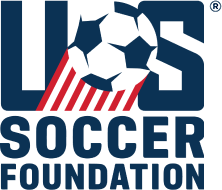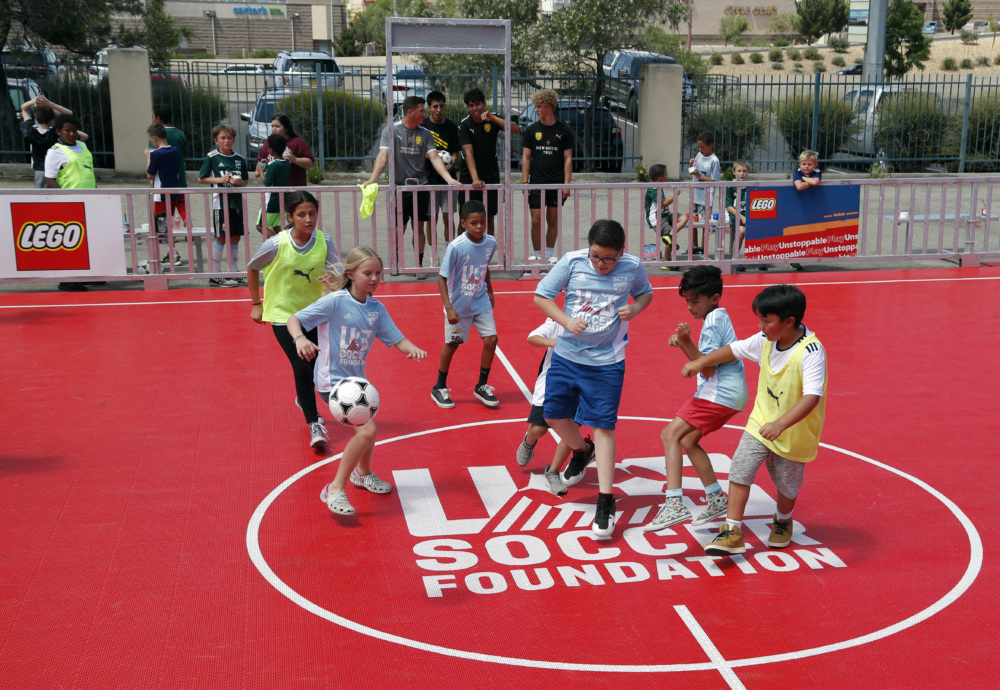

Let soccer do what soccer does.
Together, we can give millions of kids from underserved communities safe places to grow, thrive and build confidence for life.
Congressional Briefing Highlights the Important Role that Sports and Coaches Play in Developing Young Women
Washington, D.C. – Coach-mentors like those in the U.S. Soccer Foundation’s national youth soccer program, Soccer for Success, are the key to putting young people on the path to life-long health and wellness, leadership training, and success, participants at a Foundation congressional briefing said Thursday.
The Foundation’s programs have become the national model for sports-based youth development in underserved communities, but participants at the congressional briefing, held in a House committee room, said the leadership of the 3,300 coach-mentors across the country is an essential part of the program’s success.
With a panel discussion moderated by NBC News4 Washington, D.C. anchor Erika Gonzalez, participants and administrators within and from outside the Foundation’s programs spoke on the value of coaching and mentoring for young people and their families.
Coach-mentor Liana Ponce, who is with the Foundation’s Washington, D.C.-area DC SCORES Soccer for Success program, spoke about how her own participation benefited her personally and how she sees firsthand the benefits of sport for the young people she coaches. “You come together every day, you figure out what are people’s strengths – what are the differences – you can use to make a team.”
Ponce said she’s a teacher in public schools in part to provide an avenue for her coaching of young soccer players. She’s following her own mentors and coaches.
“The coaches I had really impacted my life, and not just in soccer,” she said. “I chose to become a teacher because it would allow me to be a soccer coach as well.”
And another huge value for the U.S. Soccer Foundation’s soccer program is it provides a safe place for young women to come together, she said.
Another participant in the panel discussion was 11-year-old Jessica Marroquin, who has seen the value of soccer in her own life. She’s been playing for five years and is now on two area teams.
“I love it,” she said. “I’ve learned a lot in the past five years, and I just hope I can play more.”
Marroquin thought about the coaches and mentors who have made a difference in her life. “They should be caring and respectful.”
Sarah Pickens, the U.S. Soccer Foundation’s Associate Vice President of Programs, said that growing up, she played all sports, “with a heavy emphasis on soccer,” that led her to professional soccer and, ultimately, coaching young people from three years old to college age. Youth sports, she said, gives young people a platform to practice skills of teamwork, how to win and lose with grace, conflict resolution, resilience, and especially, decision-making.
It is, she said, “a platform to develop life skills,” and the coach-mentor is “the key and critical piece to creating that safe space, to creating that positive team environment and to creating those life skills.” Foundation coaches, Ponce said, as role models and mentors, are especially important for young people in underserved communities, and especially for girls, because those young people often have less access to organized sports activities.
Elisabeth Cardiello, founder of Caffè Unimatic and Legacy Out Loud, echoed others on the benefits of team sports like soccer, and the lasting impact it has had on her career from Wall Street to entrepreneurship. “Soccer helped give me confidence. It gave me a community,” she said at the briefing.
The Foundation and MENTOR’s Abbie Evans shared how federal dollars – from the Department of Justice to the Corporation for National and Community Service to 21st Century funding – have expanded access to mentoring programs across the country, including those that leverage coaches as mentors.
Also speaking on the importance of youth sports programs – and specifically of soccer for young people – were Congresswoman Kathy Castor of Tampa, Florida, and Congressman Darin LaHood of Peoria, Illinois, who, together, are co-chairs of the Congressional Soccer Caucus.
Castor, who noted that youth soccer was an important part of her own family, recognized the value of the Foundation’s coach-mentors “to give young people a safe environment to aid in their mental, emotional, and physical development and engender and empower future leaders – especially young women.”
“You are making a huge difference in your communities,” she said.
LaHood, whose family is also very involved in youth soccer, echoed his colleague.
Without the leadership of coach-mentors around the country, “young people would not have the training and guidance to become our soccer superstars – or coach-mentors, or congressmen – of the future.”
About the U.S. Soccer Foundation:
The U.S. Soccer Foundation’s programs are the national model for sports-based youth development in underserved communities. Since its founding in 1994, the Foundation has established programs proven to help children embrace an active and healthy lifestyle while nurturing their personal growth beyond sports. Its cost-effective, high-impact initiatives offer safe environments where kids and communities thrive. Headquartered in Washington, D.C., the U.S. Soccer Foundation is a 501(c)(3) organization. For more information, visit ussoccerfoundation.org or follow us on Twitter and Facebook.
MEDIA CONTACT:
Jennifer Arnold
jarnold@ussoccerfoundation.org
202.872.6662
